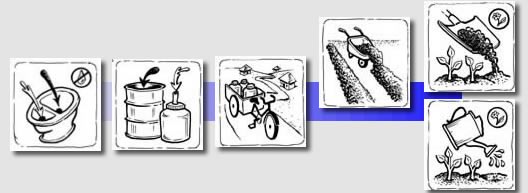Difference between revisions of "Sanitation Portal"
| Line 211: | Line 211: | ||
| − | ==Sanitation systems == | + | ===Sanitation systems === |
<div id="example">'''Example'''...</div> This is a complete sanitation system, which consists of a chain of technologies. Reading the icons in the illustration below from the left to the right we have a [[Urine Diverting Dry Toilet]] connecting to [[Storage tanks]], where the faeces are taken away through [[Human-Powered Emptying and Transport]] to be processed through [[Co-composting]] and then finally be used through [[Application of Compost - Eco-Humus]] and the [[Application of Urine]]. | <div id="example">'''Example'''...</div> This is a complete sanitation system, which consists of a chain of technologies. Reading the icons in the illustration below from the left to the right we have a [[Urine Diverting Dry Toilet]] connecting to [[Storage tanks]], where the faeces are taken away through [[Human-Powered Emptying and Transport]] to be processed through [[Co-composting]] and then finally be used through [[Application of Compost - Eco-Humus]] and the [[Application of Urine]]. | ||
| Line 229: | Line 229: | ||
<br> | <br> | ||
| − | == Acknowledgements == | + | === Acknowledgements === |
* The majority of the material in this portal was adapted from: Tilley, E. et al. (2008). [http://www.eawag.ch/organisation/abteilungen/sandec/publikationen/publications_sesp/downloads_sesp/compendium_high.pdf Compendium of Sanitation Systems and Technologies]. Eawag: The Swiss Federal Institute of Aquatic Science and Technology, Dübendorf, Switzerland. | * The majority of the material in this portal was adapted from: Tilley, E. et al. (2008). [http://www.eawag.ch/organisation/abteilungen/sandec/publikationen/publications_sesp/downloads_sesp/compendium_high.pdf Compendium of Sanitation Systems and Technologies]. Eawag: The Swiss Federal Institute of Aquatic Science and Technology, Dübendorf, Switzerland. | ||
Revision as of 23:07, 9 October 2013
| |
|
This portal describes sanitation technologies which can be applied from the household level to the village level.
A complete sanitation system does not consist of only one technology, but rather a chain of technologies, each taking care of a specific function, such as the toilet, transportation, and treatment. Each technology below is dedicated to one particular function in this chain. An example is given at the end of this page.
For a helpful sourcebook in the training of professionals for the sanitation and water sector, browse or download the set of animated PowerPoints called Sustainable Sanitation, by clicking the pink box on the right.
Below, sanitation technologies are presented in different functional groups: User interface (Toilets, urinals, handwashing), Collection and Storage / Local Treatment, Conveyance, (semi-) Centralized Treatment, and Use of products / disposal.
Sanitation systems
The table below lists eight different examples of sanitation systems, going from very simple to more complex. Of course, many other systems are possible, depending on the local context.
| 1 Single Pit System | 2 Waterless System with Alternating Pits | 3 Pour Flush System with Twin Pits | 4 Waterless System with Urine Diversion | 5 Blackwater Treatment System with Infiltration | 6 Blackwater Treatment System with Sewerage | 7 (Semi-) Centralized Treatment System | 8 Sewerage System with Urine Diversion |
Acknowledgements
- The majority of the material in this portal was adapted from: Tilley, E. et al. (2008). Compendium of Sanitation Systems and Technologies. Eawag: The Swiss Federal Institute of Aquatic Science and Technology, Dübendorf, Switzerland.
- Currently, WASTE is working on a Sanitation Decision Support tool, which will be integrated in this portal in the near future.
- Smart Sanitation Solutions produced in collaboration with Netherlands Water Partnership, WASTE, PRACTICA, IRC International Water and Sanitation Centre, SIMAWI and Partners voor Water



